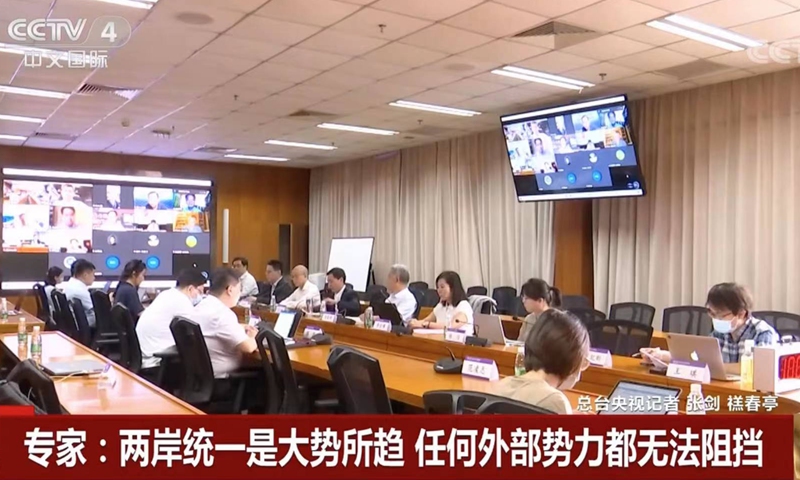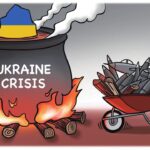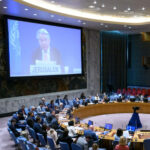In the context of the great power game between China and the US, the situation across the Taiwan Straits has entered a more dangerous and fragile new stage featuring long-term confrontation, experts on the Taiwan question said. They noted that the new stage would also be a preparation and transition period for the mainland to further create conditions for the final settlement of the Taiwan question.
On Wednesday, more than 20 scholars from universities in Chinese mainland, Taiwan region, the US and Singapore attended a senior-level seminar themed “Taiwan question under great changes” online and offline, hosted by the Institute for Taiwan Studies under China’s elite Tsinghua University.
The same day, Chinese State Councilor and Defense Minister Wei Fenghe stressed that Taiwan is China’s Taiwan and the Taiwan question is China’s internal affairs during a video speech at a Shanghai Cooperation Organisation meeting.
The recent Taiwan-related events, including US house speaker Nancy Pelosi’s provocative Taiwan trip and the mainland’s military drills that encircled the island and latest white paper on the Taiwan question and reunification in new era, were among the topics discussed during the seminar. Most of the attending experts believe that the events since the beginning of August mark a new stage in resolving the Taiwan question while the windows of peaceful reunification are not completely closed despite the escalating intensity.
Wang Yingjin, director of the Center for Cross-Straits Relations Studies at the Renmin University of China, said on Wednesday that the intensifying China-US confrontation and US obstacles to China’s national reunification have increased the complexity of resolving the Taiwan question.
Some Taiwan-based experts added that very different from the past, the Taiwan Straits have a new, more fragile and dangerous status quo. The US has done so much to make the Chinese mainland feel that Washington is supporting Taiwan secessionists, which would make the People’s Liberation Army’s (PLA) presence in the cross-Straits affairs expand in the future.
Xin Qiang, director of the Taiwan studies center with Fudan University, said the PLA’s military drills that encircled Taiwan island outlined the mainland’s mechanism of action and the counterattack response strategy. “Once the new normal is established, it must be in mainland’s favor and it can never be reversed.”
Li Zhenguang, deputy dean of the Taiwan Research Institute of Beijing Union University, said that against the backdrop of the confrontation between China and the US, whether a war will break out in the Taiwan Straits depends on whether the US can effectively control its politicians and manage its policies. If the “Pelosi incident” occurs once more, the situation will be highly likely to get out of control. The two great powers need to prevent such an extreme scenario.
In fact, the mainland has also entered a new stage in resolving the Taiwan question, said Wang Hailiang, director of the Shanghai Institute of East Asian Studies.
Wang noted that while the focus is still on peaceful reunification, the reunification process may be accelerated at any time due to sudden changes in the external situation.
Remarking on the possibility of peaceful reunification, Li Peng, dean of the Graduate Institute for Taiwan Studies of Xiamen University, said that whether peaceful reunification is still possible depends on whether the mainland is fully prepared to respond to external intervention by non-peaceful means and whether cross-Straits exchanges and integration are sufficient.
However, the situation of people-to-people exchanges between the mainland and Taiwan is not optimistic. Pelosi’s provocative Taiwan visit further aggravated the split in public opinion between the two sides of the Straits. The DPP authorities denounced mainland-proposed One country, Two systems and rejected reunification, stressing that the Taiwan people have the “democratic” right to “determine their own future.”
Wu Yongping, head of the Institute of Taiwan Studies under Tsinghua University, told the Global Times on Wednesday that “Ironically, the DPP does not allow Taiwan people to participate in the institutional arrangements after reunification, and deprives the Taiwan people of the right to decide their own destiny. This is precisely the biggest anti-democracy,” Wu said.
The latest white paper on Taiwan question actually signals an invitation to the Taiwan compatriots to participate in the future institutional arrangements, and giving up this right means that One country, Two systems can only be designed mainly by the mainland itself, Wu said.
A Taiwan-based expert said that despite the DPP authorities continuously promoted desinicization and incited anti-China populism in the island, the mainland should not abandon the chance to change Taiwan people’s mind-set.
The DPP authorities are just pawns of the US, which is on a downward trajectory, while the mainland has a strong determination and ability to pursue complete national reunification. If Taiwan people can calmly and objectively understand this situation, the number of people who pragmatically realize that reunification is inevitable will increase, Chou said.
The mainland has just weathered the toughest years, from the trade war, the riots in Hong Kong, the smearing of the human rights issue in Xinjiang region to the epidemic. In contrast, the US is rapidly entering the midterm elections and also the presidential election in 2024. With unstable domestic politics, the US is also under geopolitical pressure in Europe and Mideast, he said.
(Global Times)




